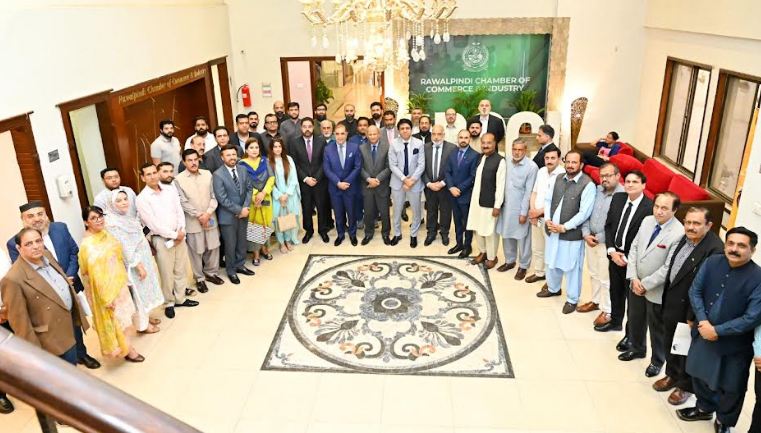RCCI Think Tank Session on Economy of Pakistan and Future Challenges

DNA
Rawalpindi: The Rawalpindi Chamber of Commerce and Industry has organized a Think Tank session on “Economy of Pakistan and Future Challenges”. President RCCI Saqib Rafiq along with Chairman RCCI Think Tank and Group Leader, Sohail Altaf and Vice Chairman Think Tank and Former President, Raja Amer Iqbal welcomed the Chief Guest Dr. Ashfaque Hasan Khan (SI), renowned Economist and Director General, NUST Institute of Policy Studies (NIPS).
Senior Vice President Muhammad Hamza Sarosh, Vice President Faisal Shahzad, Immediate Past President Ch. Nadeem A. Rauf, Former Presidents, Executive Committee members, representatives from tax bar associations, women members & distinguished members of RCCI also attended the session.
In his welcome remarks President RCCI Saqib Rafiq shared the scope and aim of RCCI Think Tank and remarked that the idea behind this was not to identify the challenges and shortcomings in the economy but at the same time provide the viable solutions to address economic challenges.
Chairman Think Tank, Mr. Sohail Altaf said that Pakistan stands at a critical juncture in its economic journey. While we have made significant strides in recent years, we also face formidable challenges that require bold and decisive action. From structural weaknesses to external pressures, from socio-economic differences to environmental sustainability, the road ahead is fraught with both obstacles and opportunities.
Dr. Ashfaque Hasan appreciated RCCI’s initiative of Think Tank on Economy and assured his support and assistance for recommendations and input for policy reforms. Dr. Ashfaque Hasan also gave a detailed presentation on current economic challenges, historical data analysis and way forward to come out of the economic hurdles.
Vice Chairman Raja Amer Iqbal in his address shared historical background and data analysis on Pakistan GDP Growth and Debt obligations.
A detailed Question and Answer session was also held where participants asked questions on different factors, including, inflation, interest rate, cost of production, competitiveness, amnesty schemes, IMF loans, industrialization and debt payments.
Related News

ICCI vows pro-business advocacy
ISLAMABAD, JUL 12 /DNA/ – Nasir Mansoor Qureshi, President of the Islamabad Chamber of CommerceRead More

APBF urges refinement of new tax laws
KARACHI, JUL 12 /DNA/ – The All Pakistan Business Forum (APBF) has taken note ofRead More


Comments are Closed